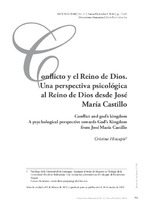| dc.contributor.author | Hincapié, Cristina | |
| dc.coverage.spatial | Seccional Medellín | spa |
| dc.date.accessioned | 2021-02-08T20:56:03Z | |
| dc.date.available | 2021-02-08T20:56:03Z | |
| dc.date.issued | 2014 | |
| dc.identifier.uri | http://hdl.handle.net/20.500.11912/7989 | |
| dc.description | p. 73 - 83 | spa |
| dc.description.abstract | El Reino de Dios, ese que Jesús anunciaba a su pueblo, ha sido tema de importantes reflexiones y estudios exegéticos que buscan dilucidar de qué clase de Reino se trataba. ¿Ese Reino está en los cielos, al final de la vida en la tierra o más bien es una manera de estar aquí, ahora, en relación conmigo mismo, con Dios y con mi prójimo? En ese sentido, José María Castillo, con sus interesantes ideas sociales y teológicas, hace un llamado que la psicología escucha y comprende por su cercanía con el alma humana, su sufrimiento y su estar en este mundo carente de sentido. Por tal motivo, la preguntas a desarrollar aquí serán: ¿Cuál es la responsabilidad del teólogo y del cristiano frente a la predicación del Reino? Y además, ¿cómo la vía interior, propuesta por la psicología profunda y desarrollada por el psiquiatra suizo Carl Gustav Jung, pueden darnos luces para afrontar este tema en realidades como la nuestra? Para así, poder concluir con Leonardo Boff que “el Reino de Dios no es un territorio, sino un nuevo orden de las cosas [del que todos somos responsables]”. | spa |
| dc.description.abstract | The Kingdom of God, the one proclaimed by Jesus, has been the main subject of significant cogitations and exegetical studies, which are trying to explain what kind of Kingdom He was talking about. Is that Kingdom in heaven, at the end of life on earth? or is it a way of being here and now, making a connection with myself, with God and with my neighbor? According to that, José María Castillo –using some social and theological ideas, influences psychology because of the proximity of it to the human soul, its suffering and its existence in a senseless world. That is why this article attempts to answer the following questions: Which is the responsibility of a theologian and a Christian to the preaching of the Kingdom? How can the Carl Gustav Jung’s inner way –posited by depth psychology– shed light on this issue in a reality as ours? Following these ideas, we are able to conclude saying that, according to Leonardo Boff, “the Kingdom of God is not a territory, but a new order of things [which we are all responsible for]”. | spa |
| dc.format.mimetype | application/pdf | |
| dc.language.iso | spa | |
| dc.publisher | Universidad Pontificia Bolivariana | spa |
| dc.relation.ispartof | Pensamiento humanista | spa |
| dc.rights | Attribution-NonCommercial-NoDerivatives 4.0 International | * |
| dc.rights.uri | http://creativecommons.org/licenses/by-nc-nd/4.0/ | * |
| dc.subject | Conflicto | spa |
| dc.subject | Reino de Dios | spa |
| dc.subject | Psicología profunda | spa |
| dc.subject | José María Castillo | spa |
| dc.subject | Responsabilidad del teólogo | spa |
| dc.subject | Conflict | spa |
| dc.subject | Kingdom of God | spa |
| dc.subject | Depth psychology | spa |
| dc.subject | José María Castillo | spa |
| dc.subject | Responsibility of the theologian | spa |
| dc.title | Conflicto y el Reino de Dios. Una perspectiva psicológica al Reino de Dios desde José María Castillo | spa |
| dc.title.alternative | Conflict and god’s kingdom A psychological perspective towards God’s Kingdom from José María Castillo | spa |
| dc.type | article | spa |
| dc.rights.accessRights | openAccess | spa |
| dc.type.hasVersion | publishedVersion | spa |
| dc.description.sectional | Medellín | spa |
| dc.identifier.instname | instname:Universidad Pontificia Bolivariana | spa |
| dc.identifier.reponame | reponame:Repositorio Institucional de la Universidad Pontificia Bolivariana | spa |
| dc.identifier.repourl | repourl:https://repository.unab.edu.co/ | |


